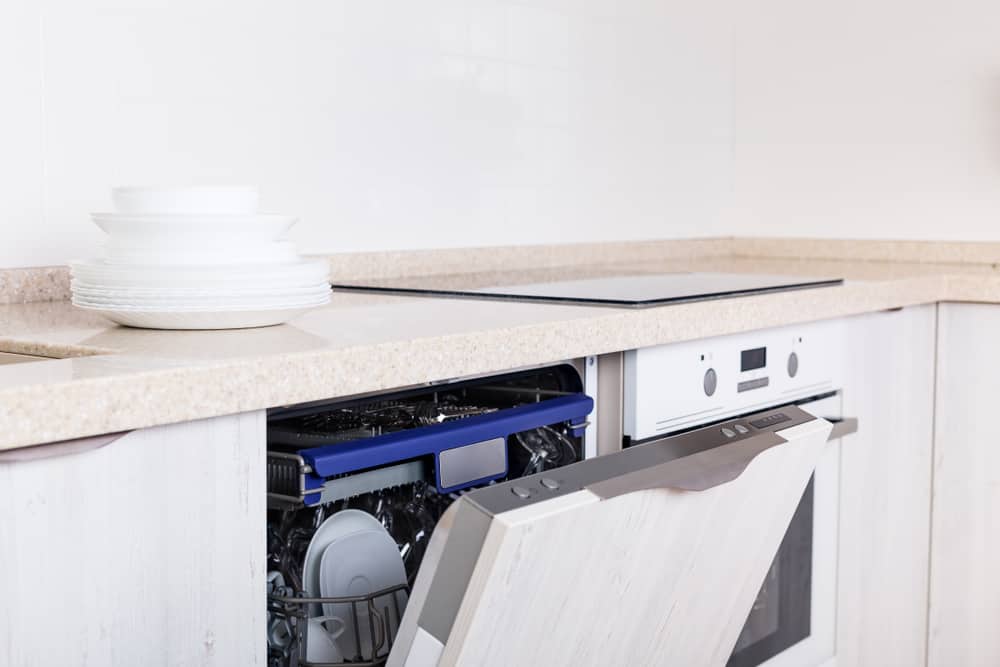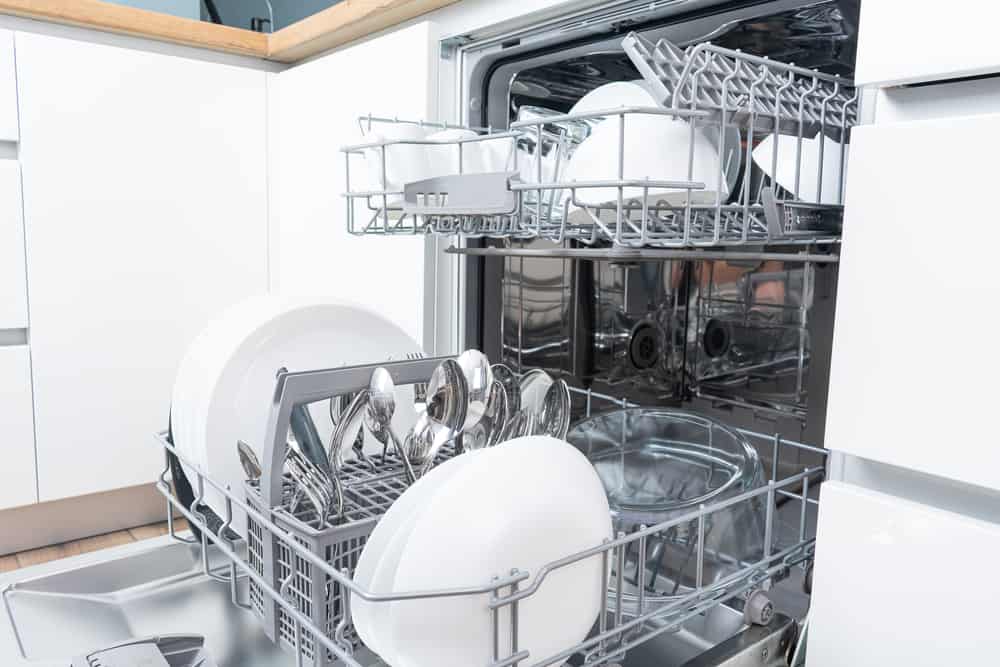Dishwashers are super helpful and convenient if you have a large family or have guests over for dinner. They take the hassle away from doing dishes daily, and if you’re moving, you undoubtedly want a dishwasher in your new home.
Can you go to a big box retail store and load one in your truck by yourself? Are they easy to install and move around your kitchen without help?
It depends.
There are so many different types of dishwashers, each built to separate specifications. Some you can move without help - for others, you'll need at least one other person to help you carry, transport, and set it up in your kitchen.
There is no "average dishwasher" weight, but this post aims to give the scoop on what to expect.

Standard built-in dishwashers can easily way 100 lbs or more and are awkward to handle
At the small end of the spectrum, we have a countertop dishwasher. Unsurprisingly, these are fairly lightweight. They hook up to your sink and rest on top of the counter. They're specifically designed to be small and have a very small load capacity. They're light enough to be moved by a single person and can weigh as little as 35 pounds.
On the other end of the scale are built-in and stand-alone dishwashers. Built-in dishwashers don't have side panels - they are usually installed in between cabinets. Stand-alone dishwashers - this may not surprise you - can be placed anywhere in the kitchen. They have finished side panels and don't have to be nestled in between counters. Both of these types of dishwashers are highly capable and are built for large capacity dishwashing loads. You generally need two people to get these into their final installation position. They can weigh as much as 150 pounds or more.
There are three distinctive dishwasher types that we’ll discuss in the following section. Then, we’ll dive into establishing what factors contribute to the overall dishwasher weight. Finally, we’ll give some suggestions on how you can move your dishwasher if you want to take it with you to your new home.
Dishwashers can be built-in, countertop, or portable.
These dishwashers are the most common model in households. Built-in dishwashers become a permanent fixture in your kitchen. They hook up to your existing plumbing - usually underneath the sink. They'll take advantage of your hot water hookup, and they drain through your pipes as well - oftentimes through your garbage disposal. The total weight range for these built-ins can be anywhere from around 50 to 125 pounds.

Built-in dishwashers are among the heaviest types of dishwasher
Many built-in dishwashers come with a top control panel. This type of panel is essentially hidden when you're looking at the dishwasher because all the buttons, controls and settings for the dishwasher are located on the very top edge of the door. This makes all the dishwasher cycle buttons invisible when the door is closed. Instead, people in the kitchen will see a seamless, uniform dishwasher door.
This type of control panel actually adds to the overall weight of the machine. You can count on top control dishwashers weighing around 15 pounds more than a dishwasher with the controls on the front of the door. If you're concerned about having a lighter dishwasher, you're going to want to get a front control panel model (as opposed to top control).
If you don't have much space in your kitchen, a countertop dishwasher may be a good fit for you. They're super lightweight (as little as 30 or 35 pounds) - and they'll easily fit on your countertop while running. As mentioned previously, all you have to do is hook your countertop dishwasher up to your sink, and it will run very small loads of dishes.
They're easy to carry and store - which is essential since you probably don't want your dishwasher taking up valuable counterspace. This makes them ideal for apartment dwellers in large cities where space is at a premium. Their light size and relatively small dimensions make them easy to stow somewhere out of the way.
If you're worried about the weight of a dishwasher, why not get one with rollers (or casters). While these dishwashers can typically weigh anywhere from 50 to 100 pounds, that weight really isn't a hindrance to positioning the portable dishwasher in your kitchen. Portable dishwashers have 4 rollers on the bottom (one on each corner). This makes it extremely easy to move the portable dishwasher around your kitchen when you need to do a load of dishes.
Just roll your portable dishwasher near your sink, hook it up to your water and your drain, then run a load of dishes. When your dishes have been cleaned and put away, you can unhook the portable dishwasher and put it back in storage - usually a closet is the perfect fit.
Anywhere from 30 pounds to 150 pounds.
30 Pounds - Countertop Dishwashers - Move it Yourself
We'll start with the lightest dishwashers that reside on the countertop. The median weight of a standard residential dishwasher is under 100 pounds. Most standard dishwashers will clock in at between 65 and 95 pounds.
80 Pounds - Standard Dishwashers - Get a Friend to Help Move it
The next step up in weight class is the standard dishwasher that is commonly found in many kitchens in the United States. In general, a standard 24-inch built-in dishwasher weighs close to 80 pounds. You can fairly easily pull it out and reposition it with the help of a friend for troubleshooting when the dishwasher isn't fully loaded.
110 Pounds - Portable Dishwashers - Roll it Everywhere
Portable dishwashers tend to be on the heavier side when compared with the other two classes of dishwashers. The sides of portable dishwashers are finished (unlike standard built-in dishwashers) which can add a bit to the weight. Fortunately, you can easily roll them to the sink and back to the closet where they're stored.
Based on what we’ve talked about thus far, dishwasher weights depend on the size and type. A countertop dishwasher will be lighter than a built-in dishwasher. A general rule of thumb to follow is the larger the dishwasher, the heavier it will be.
There are a few factors to keep in mind when considering the weight of a dishwasher. First, the material. The lighter the material, the lighter the overall weight. Most dishwashers have plastic, aluminum, or stainless steel parts.

The components used in the construction of your dishwasher help to determine the weight
Additionally, the size contributes to the heaviness. For instance, a regular built-in dishwasher compared to a compact dishwasher. Drawers and trays make a massive impact on the weight. If your dishwasher has two or more glass or utensil trays, the weight will be significantly higher.
Surprisingly, the door also makes a difference in overall weight. If the dishwasher sports a handle or see-through glass, the quality of these aspects will alter the heaviness.
Now that you better understand the average weight for built-in, portable, and countertop dishwashers, let’s look at some popular brands and their corresponding weights and dimensions.
If you want to install a dishwasher on your own, this section is beneficial to give you a better idea of what to expect with weight, size, and type. You’ll be sure that the dishwasher fits with the right features that fulfill your needs.
You can see from this small sample that Whirlpool corporation dishwashers vary widely in weight - from 55 lbs to well over 100 lbs. They get heavy and awkward to move around.
Do not lift a dishwasher on your own. Even a lighter dishwasher can be too heavy for a single person to lift. You risk injuring yourself, so it’s advisable to hire professional movers or take a couple of friends or family members to help move the appliance.
Moving a dishwasher is tricky since they’re large, clunky units. It’s better to hire a team of trained professionals to move your dishwasher. It's almost impossible to single-handedly move a dishwasher without risking damage to yourself and the appliance.
Therefore, you should reach out to a professional service if you’re worried about your safety and the appliance.
It’s advisable to rent a truck or van when you move a dishwasher. Pick-up trucks work well with bigger cargo space. A truck with a ramp works best. Unless you're transporting a small, countertop dishwasher use a larger vehicle (not a sedan-like car).
It makes it easier to roll the dishwasher on and off. Use a dolly when moving heavy appliances into your truck. Avoid lifting dishwashers by hand - while they aren't extremely heavy, they are awkward to lift and can result in damaging the dishwasher or hurting yourself.
Use straps to secure the unit down. Protect the dishwasher with bed sheets or another cover, like pads or bubble wrap. This process shields the dishwasher from elements during the trip and also makes sure you won’t ding the walls on the way into the house.
Lay the dishwasher down as you transport it on its side, rather than back due to the connecting pipes. Check that the surface is flat, or could you risk damaging the sides.
Knowing the weight of your dishwasher is crucial because it plays a major role in how difficult it is to move. You can use a dolly to ensure your well-being or reach out for help if you feel hesitant about moving a large appliance.
If you're transporting or moving your dishwasher from one location to another we've provided some steps to follow below:
